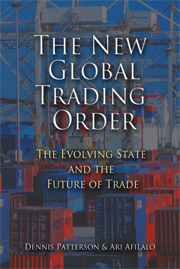Book contents
- Frontmatter
- Contents
- Preface
- 1 Introduction
- 2 The Evolving State
- 3 The Changing Nature of Welfare
- 4 Disaster and Redemption: 1930s and Bretton Woods
- 5 The Transformation of the Bretton Woods World and the Rise of a New Economic Order
- 6 The End of Bretton Woods and the Beginning of a New Global Trading Order
- 7 The Enablement of Global Economic Opportunity
- 8 Trade and Security
- Conclusion
- Notes
- Bibliography
- Index
7 - The Enablement of Global Economic Opportunity
Published online by Cambridge University Press: 02 July 2009
- Frontmatter
- Contents
- Preface
- 1 Introduction
- 2 The Evolving State
- 3 The Changing Nature of Welfare
- 4 Disaster and Redemption: 1930s and Bretton Woods
- 5 The Transformation of the Bretton Woods World and the Rise of a New Economic Order
- 6 The End of Bretton Woods and the Beginning of a New Global Trading Order
- 7 The Enablement of Global Economic Opportunity
- 8 Trade and Security
- Conclusion
- Notes
- Bibliography
- Index
Summary
Thesis:
The trade system requires a new animating norm: the enablement of global economic opportunity. The modern liberal democratic victors of World War Ⅱ should effect a fundamental shift toward global economic opportunity, replacing a regime of regulation with one driven by incentives.
In Chapter 6, we began to develop the substance of the new animating norm of the international trading system: the enablement of global economic opportunity. Additionally, we began to define the contours of the norm when discussing the institutions that we think should be charged with its implementation. In this chapter, we develop in greater depth our conception of the enablement of global economic opportunity as an animating “constitutional principle.” In the first part of the chapter, we start with an evaluation of the norm in light of a construct for judging the legitimacy of international norms. In the second part, we present various scenarios that illustrate how it might be applied by the framers of the international trade system. We conclude with an explanation of why the interests of the principal strategic and economic players of the early post-modern world would be well-served by a reform of the WTO organization that could institutionalize the norm and give it constitutional preeminence comparable to that of comparative advantage.
LEGITIMACY AND REALIZABILITY
The question of the legitimacy of international legal norms has been a preoccupation of academics and commentators alike.
- Type
- Chapter
- Information
- The New Global Trading OrderThe Evolving State and the Future of Trade, pp. 147 - 185Publisher: Cambridge University PressPrint publication year: 2008



